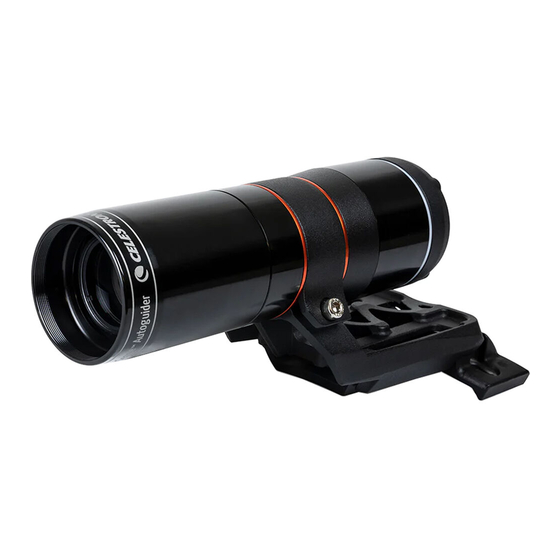Celestron StarSense 94008 Kullanım Kılavuzu - Sayfa 10
Aksesuarlar Celestron StarSense 94008 için çevrimiçi göz atın veya pdf Kullanım Kılavuzu indirin. Celestron StarSense 94008 12 sayfaları. 94008
Ayrıca Celestron StarSense 94008 için: Kullanım Kılavuzu (3 sayfalar), Kullanım Kılavuzu (15 sayfalar)

Factory Reset
A factory reset power cycles SSAG and clears the device of any previous
center calibration data. When you turn on SSAG after a Factory Reset,
it will automatically initiate a new center calibration after sky alignment.
6. Focusing
Technicians at the factory have focused your StarSense Autoguider, and
it should not need further adjustment. However, if you fi nd that SSAG is
not working as it should (e.g., reporting "No Stars!" when there are plenty
of stars visible in the sky), you should check the focus.
To focus StarSense Autoguider:
1. Follow the process outlined above to access the Live View in CPWI.
2. If you are focusing during the day, point SSAG at an object at least a
quarter mile away. If you are focusing at night, point SSAG at a bright
star. You should see an image onscreen.
NOTE: If you are attempting to focus during very bright daytime conditions,
try adding a 2" neutral density fi lter to dim the view. Refer to the
Using Filters section later in this manual for more details.
3. If the focus is sharp, you are done. If not, remove SSAG's front cover
by grasping it and rotating it counterclockwise until it comes off
(Fig. 21). Only remove the front cover, not the entire front of the
housing.
Front Cover
Focus Lock Ring
Fig. 21: Only remove the front cover, not the entire front of the housing.
4. Loosen the focus lock ring (Fig. 22).
Focus lock ring
Fig. 22: Loosen the lock ring when making focus adjustments, then fi rmly
retighten when focused.
5. Rotate the optics clockwise by a quarter- to half-turn to see if
focus improves. If it does, continue rotating until the focus is as
sharp as possible. If the focus does not improve, rotate the optics
counterclockwise until the focus improves.
6. When you see a sharp image, retighten the lock ring and reinstall
SSAG's front cover. If desired, you can now disconnect SSAG from
the PC's USB port.
7. Status LED Ring
Toward the rear of the SSAG enclosure, you'll fi nd the LED status ring
(Fig. 23). The status ring illuminates when you connect SSAG to a
Celestron mount that is powered on. The ring provides "at a glance"
status messaging for SSAG.
10
| ENGLISH
The status ring has three modes:
Steady on: SSAG is receiving power and idle.
Quick pulsing: SSAG is calculating a plate solve.
Pulse: SSAG has executed a guide correction during autoguiding.
Constant blinking that never stops: Contact Celestron Technical
Support at celestron.com/pages/technical-support
LED Ring
Fig. 23: The LED ring indicates SSAG's status at a glance.
8. Using Filters
SSAG's front housing is threaded to accept standard 2" fi lters (Fig. 24).
The most helpful fi lter to pair with your SSAG is an IR-pass fi lter that
blocks most visible wavelengths (400-700nm) but passes wavelengths
above 700nm. With this fi lter, you can align your telescope with SSAG
during twilight. Even though you won't be able to see stars with your
eyes, SSAG will detect the near-infrared wavelengths and align your
telescope before it even gets dark! A 2" neutral density fi lter or Moon
fi lter can reduce excessive brightness when adjusting SSAG's focus
during the day.
2" Filter
Fig. 24: You can mount standard 2" fi lters onto the front of SSAG.
9. Updating SSAG's Internal Software
with CFM
Our engineers are constantly working on upgrades and improvements to
our products, so we recommend periodically checking for SSAG internal
software updates at celestron.com/CFM. If a new SSAG software
update is available, you can download and install it with the Celestron
Firmware Manager (CFM) software. Follow these steps to update
SSAG's software:
1. Set up as you usually would, with the NexStar+ hand control and
SSAG plugged into the mount's AUX ports.
2. Power on the mount.
3. Connect the USB port on the bottom of the hand control to your PC.
You'll need a USB Type-A to USB Mini-B cable (not supplied). The
computer should recognize the mount.
